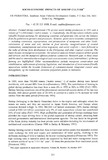Socio-economic impacts of shrimp culture
- Global styles
- MLA
- Vancouver
- Elsevier - Harvard
- APA
- Help

View/
Date
1998Author
Page views
2,630ASFA keyword
AGROVOC keyword
Metadata
Show full item record
Share
Abstract
Farmed shrimp contributed 27% of total world shrimp production in 1995 with a volume of 712,000 tonnes ('metric tonnes,' t). Undoubtedly, the shrimp culture industry earns valuable foreign exchange for developing countries and generates jobs across the industry from fry gatherers to growers and processors. However, grave socio-economic consequences — including conversion, expropriation, and privatization of mangroves and other lands; salinization of water and soil; decline in food security; marginalization of coastal communities; unemployment and urban migration; and social conflicts — have followed in the wake of shrimp farm development in the Philippines and other tropical countries. The paper focuses on mangrove ecosystems: the valuation and cost-benefit analysis of their goods and services and the mangrove-offshore fisheries connection. Research gaps in these areas and the need to internalize the ecological and socio-economic costs ('externalities j of shrimp farming are highlighted. Other recommendations include mangrove conservation and rehabilitation, enforcement of existing legislation, and introduction of environment-friendly aquaculture within the broader framework of community-based, integrated coastal area management, eg the traditional, extensive polyculture ponds in Indonesia.
Description
Appeared in Aquaculture Research (1997) 28:815-827.
Suggested Citation
Primavera, J. H. (1998). Socio-economic impacts of shrimp culture. In M. Beveridge, R. Fuchs, J. Furberg, N. Kautsky, A. Reilly, & P. Sorgeloos (Eds.), Aquaculture Research and Sustainable Development in Inland and Coastal Regions in South-East Asia: Proceedings of an IFS/EU Workshop, Can Tho, Vietnam, 18-22 March 1996 (pp. 231–247). Stockholm, Sweden: International Foundation for Science (IFS).
Type
Conference paperCollections
- Conference Proceedings [300]


